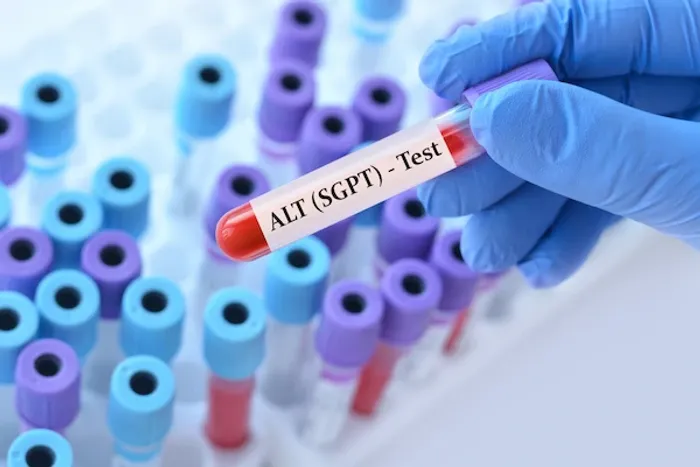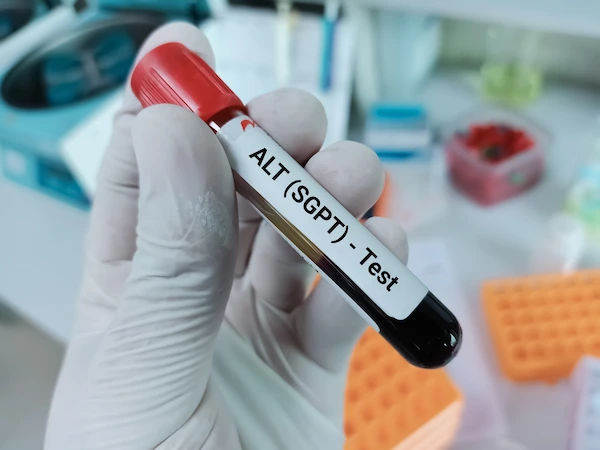SGPT Test Overview and Interpretation
Learn about the SGPT test, its purpose in assessing liver health, how it’s performed, and how to interpret the results for early detection and management of liver conditions.


Introduction
If you’ve ever had a liver function test, you may have come across the term SGPT (Serum Glutamic Pyruvic Transaminase). This test is crucial for assessing liver health, but many people don’t fully understand what it means. In this article, we’ll break down everything you need to know about the SGPT test, what it is, why it’s done, how to interpret the results, and what steps you can take if your levels are high.
What is the SGPT Test?
SGPT, also known as ALT (Alanine Aminotransferase), is an enzyme found mainly in the liver. When liver cells are damaged or inflamed, SGPT is released into the bloodstream. Measuring its levels helps doctors detect liver problems early.
Consult a Gastroenterologist for the best advice
Why is the SGPT Test Done?
Your doctor may recommend an SGPT test if you:
- Have symptoms of liver disease (fatigue, nausea, jaundice, dark urine, or abdominal pain).
- Are at risk of liver damage due to conditions like hepatitis, fatty liver, or alcohol use.
- Are taking medications that may affect the liver.
- Need routine health check-ups.
Get Your Health Assessed
Understanding SGPT Test Results
SGPT levels are measured in units per litre (U/L). The normal range varies slightly between labs but generally falls within:
- Men: 7–56 U/L
- Women: 5–36 U/L
What Does a High SGPT Level Mean?
Higher-than-normal SGPT levels suggest liver damage or disease. Common causes include:
- Fatty liver disease (due to obesity or diabetes).
- Hepatitis (B or C) – viral infections that inflame the liver.
- Alcohol-related liver damage.
- Medications (like painkillers, statins, or antibiotics).
- Autoimmune liver diseases.
Mild elevation (slightly above normal): May indicate minor liver stress, often reversible with lifestyle changes.
Moderate to severe elevation (2–10 times higher): Suggests significant liver damage needing medical attention.
What If SGPT is Low?
Low SGPT levels are usually not a concern unless other liver tests are abnormal.
How to Lower High SGPT Levels?
If your SGPT is elevated, your doctor will investigate the cause. Meanwhile, you can take steps to improve liver health:
1. Dietary Changes
- Eat liver-friendly foods: Leafy greens, nuts, whole grains, and lean proteins.
- Reduce processed foods, sugar, and fried items.
- Stay hydrated – water helps flush out toxins.
- Limit alcohol – excessive drinking harms the liver.
2. Exercise Regularly
Physical activity helps reduce fat buildup in the liver, especially in fatty liver disease.
3. Avoid Unnecessary Medications
Some over-the-counter drugs (like acetaminophen) can raise SGPT. Always consult a doctor before taking new medications.
4. Manage Underlying Conditions
If diabetes, obesity, or hepatitis is causing high SGPT, proper treatment can help.
When to See a Doctor?
Consult a healthcare provider if:
- Your SGPT is significantly high.
- You experience symptoms like jaundice, fatigue, or abdominal swelling.
- You need guidance on liver-friendly lifestyle changes.
Final Thoughts
The SGPT test is a simple yet powerful tool to monitor liver health. If your levels are high, don’t panic; many cases are reversible with the right care. Focus on a healthy diet, regular exercise, and avoiding liver toxins. Always follow up with your doctor for personalized advice.
Consult a Gastroenterologist for the best advice
Consult a Gastroenterologist for the best advice

Dr Rohit Sureka
Gastroenterology/gi Medicine Specialist
15 Years • MBBS, DNB General Medicine, DNB Gastroenterology
Jaipur
Apollo 247 virtual - Rajasthan, Jaipur
Dr. Vijay Rai
Gastroenterology/gi Medicine Specialist
19 Years • MBBS,MD General Medicine,MD GASTROENTOLOGY
Kolkata
Livgastro, Kolkata

Dr. Neeraj Nagaich
Gastroenterology/gi Medicine Specialist
26 Years • MBBS, MD General Medicine, DM Gastroenterology
Jaipur
Dr. Neeraj Nagaich Clinic, Jaipur
Dr. Debasis Sardar
Gastroenterology/gi Medicine Specialist
14 Years • MBBS , MD (General medicine) , DM (Gastro)
Kolkata
Livgastro, Kolkata

Dr. Harsh Gupta
Gastroenterology/gi Medicine Specialist
14 Years • MBBS, MD General Medicine, DM - Gastroenterology
Jaipur
GUPTA GASTROCARE, Jaipur
Consult a Gastroenterologist for the best advice

Dr Rohit Sureka
Gastroenterology/gi Medicine Specialist
15 Years • MBBS, DNB General Medicine, DNB Gastroenterology
Jaipur
Apollo 247 virtual - Rajasthan, Jaipur
Dr. Vijay Rai
Gastroenterology/gi Medicine Specialist
19 Years • MBBS,MD General Medicine,MD GASTROENTOLOGY
Kolkata
Livgastro, Kolkata

Dr. Neeraj Nagaich
Gastroenterology/gi Medicine Specialist
26 Years • MBBS, MD General Medicine, DM Gastroenterology
Jaipur
Dr. Neeraj Nagaich Clinic, Jaipur
Dr. Debasis Sardar
Gastroenterology/gi Medicine Specialist
14 Years • MBBS , MD (General medicine) , DM (Gastro)
Kolkata
Livgastro, Kolkata

Dr. Harsh Gupta
Gastroenterology/gi Medicine Specialist
14 Years • MBBS, MD General Medicine, DM - Gastroenterology
Jaipur
GUPTA GASTROCARE, Jaipur

